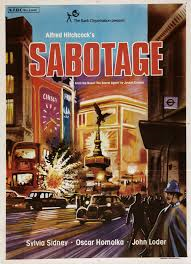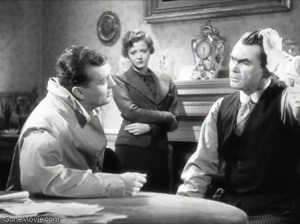
In a very loose way this film is based on Joseph Conrad’s The Secret Agent (1907) and the novel is unsurprisingly much stronger than the film. Conrad’s novel is one I particularly enjoyed studying at university as although from the modernist period his experimentation with narrative style does not make the story incomprehensible. It does challenge the notion of narratives working chronologically though, utilising a more fragmented time sequence. Conrad’s depiction of time is very interesting in that time is more than the number you see on your wrist watch, it is subjective and subject to human judgement and even becomes fused with the characters themselves, which brings about a wonderfully chilling moment near the end of the novel with Mr and Mrs Verloc. However that is the novel, not Hitchcock’s film which is much more focused on the act of sabotage, even beginning the film with a dictionary definition of the word. Moreover, since this is a film and not a novel the characters are only viewed from the outside and consequently there is much less focus on the character of Mr Verloc. I was therefore also not surprised, although slightly puzzled when in the opening credits Mr Verloc and his brother in law are named in reference to Mrs Verloc. Interestingly the film was also titled as The Woman Alone, which again suggests a shift in focus from Mr to Mrs Verloc.
In Sabotage (1936) there is oddly enough a saboteur at work with the film opening with someone plunging London into darkness and some belaboured dialogue confirms this for us. The film then cuts to Mrs Verloc (played by Silvia Sidney) who runs a cinema with her husband (played by Oskar Homolka), the latter of whom is the saboteur in question. It is hinted that the local green grocer, Ted (played by John Loder) sees Mrs Verloc as more than just a neighbour, though at this stage his tender feelings come under question when we are soon informed of his real job: a policeman. Mr Verloc’s act of sabotage is not very successful as everyone just finds it funny, which does not impress Verloc’s employer who demands he puts a bomb in an underground station next Saturday, an act Verloc has great qualms about.

As Verloc and a number of confederates work towards Saturday’s explosion, Ted works on pumping information out of Mrs Verloc and her brother Stevie, a callow and not particularly reliable youth. Mr Verloc himself is being tailed by other policemen and when Saturday arrives it seems he might not be able to go ahead with his plan, until he has his fateful idea… The consequences of this alternative plan are far reaching and devastating for him and his family and in fairness to Hitchcock he does create a well-executed and suspense driven explosion scene.
SPOILER – If you don’t want to know the ending of the film (or Conrad’s novel) skip this next section
In Conrad’s original work, Stevie, on Mr Verloc’s orders, unknowingly takes the bomb to the allotted location. Yet due to his clumsiness he falls over whilst carrying it and dies in the ensuing explosion. Mrs Verloc finally puts two and two together and decides to take revenge on her husband by murdering him. A man who has been in love with her for a while helps her to flee the country, but then abandons her on the boat (though keeping her money), leading to her suicide. In the film to be fair Hitchcock does keep some of this plot element with Stevie still dying and Mrs Verloc still murdering her husband. However, after this point Hitchcock strongly deviates from the novel, tacking a happy ending of sorts on to the end of the film with Ted declaring his love for Mrs Verloc and planning their escape from the UK. But when Mr Verloc’s body is found too early Ted obstructs the subsequent police investigation to prevent Mrs Verloc being arrested and he then pushes her into marriage, she is actually quite happy to turn herself into the police. Early elements of this ending did remind me of a Greek tragedy.
Consequently although Mr Verloc is the official saboteur of the film, I would argue that Ted is actually the greater saboteur as he sabotages the Verloc marriage, as it is his questioning of Mrs Verloc which causes her to suspect her husband. Furthermore, he sabotages the police investigation at the end of the film, perverting the cause of justice so he can marry a woman who has a just murdered her husband (an element I found a bit disturbing and a reason why the supposedly happy ending doesn’t work). Additionally, Ted as a character does not exist in Conrad’s novel so all of his action in the film adds to Hitchcock’s deviation from the original story and therefore can be seen as a principal element of the sabotage Hitchcock enacts on Conrad’s far superior work.
SAFE TO RESUME READING
Interesting Facts (for me anyways):
- According to the opening credits Walt Disney was responsible for a cartoon arrangement in the film.
- Charles Hawtrey, who is famous for his roles in the Carry On films, plays a small unnamed role in the production as a studious youth.

Overall I don’t think Hitchcock portrayed Mr Verloc’s character quite right in the film, as he came across as far too unimpressive and whingey, which may have come about because Hitchcock seems to focus more on action than on character in this film. The reason for my lower rating is primarily due to the fact that I have read Conrad’s novel as it is hard to not see the film version as inferior, as Hitchcock’s choice of ending is unsatisfying and I think Conrad creates a much more innovative and original work. However, if you have not read the novel then you will probably enjoy the film more, though I feel anyone would have some doubts about the ending.
Rating: 3/5
Well, it makes sense that, having not read the book – and Hitchcock freak that I am – I would like this film more than you did. The issue with Ted is a troubling one, I grant you. Hitchcock did much the same thing, although to better effect, back in 1929 with Blackmail, which dealt more specifically with good people caught in untenable moral positions. (Or maybe these “good” people weren’t so good to begin with.) Still, I think this film has a lot to recommend it, including some scenes that show the young Hitchcock’s prowess at creating suspense!
I show the explosion scene every year to my film class to illustrate how Hitchcock employs various shots to kick up the suspense. It’s interesting to know that he learned a valuable lesson here, one he talked about in a lot of interviews: having ratcheted up the suspense to unbearable heights, throwing a kid, a puppy and an old lady into the mix, Hitchcock would discover that killing the kid was a mistake. Audiences at that time wouldn’t forgive that kind of cruelty. I grant you that horrible things happen, and today’s films depict them with frequency. Hitch felt that audiences who had been made to sweat needed the release to be a positive one. (He did go back to killing a nice person slowly in FRENZY, so he wasn’t always consistent, but it took a lot of years.
I love the Disney part! Mrs. Verloc has just learned that her brother is dead, and she’s stuck in the cinema with a bunch of kids laughing at “Who Killed Cock Robin?” Even she is brought to laughter through her tears. I thought it was a cool moment.
And about that “murder” of husband by wife! That is THE classic sequence in that film: totally silent, she’s slicing the roast beef and he realizes even before she does that the knife could serve as a weapon. I always felt that this “murder” was a joint venture between the two of them. In his guilt and fear of retribution, Mr. Verloc almost willed his own death at the hands of the woman who most deserved to execute him.
Maybe if I had read the book first, I would have the same qualms. I know how radically Hitchcock changed the novels he adapted. Sometimes he was forced to by the studios, as he was in SUSPICION. Sometimes he made a story richer and deeper, as he did in REAR WINDOW. But I’ll never argue with a person who thinks the book was better – it almost always is!
LikeLiked by 3 people
I definitely agree the explosion scene in the film is brilliant and the spouse murder scene is also good, though the novel is far more chilling where the dripping blood of Verloc becomes a ticking sound like a clock and up until he dies the scene is from his point of view which I really enjoyed. I have also watched Rear Window and I really liked it, but then I have not read the novel behind it so that probably helps. I would definitely recommend reading The Secret Agent, not that you need any help with adding to your TBR pile.
LikeLike
My understanding is that the trailer in your post doesn’t belong to Sabotage the 1936 film directed by Hitchcock, but to Saboteur a 1942 film also directed by Hitchcock. The 1936 is based on Conrad’s The Secret Agent while the 1942 has an original screenplay. Both films are unrelated.
LikeLiked by 2 people
Hmm it seems that the opening pic is from the film that I watched and then cuts to the 1942 film you refer to. Thanks for pointing this out. I’ll try and find the correct film.
LikeLike
I’ve had a look for a trailer but there doesn’t appear to be one though it seems through IMBD website and youtube you can watch the whole film for free. It’s unusual that there is no trailer available.
LikeLike
The 1996 film The Secret Agent is more faithful to the Conrad novel. A trailer should be available of this film.
LikeLiked by 1 person
I didn’t realise there was a more recent adaptation of The Secret Agent. Glad it is more faithful to the original novel. Still mystified by the lack of trailer for the 1936 version though.
LikeLike
[…] be thinking there have been some big omissions. In the case of films such as Suspicion (1941) and Sabotage (1936), I have watched them and love is key element of them, but for me as my separate reviews of […]
LikeLike